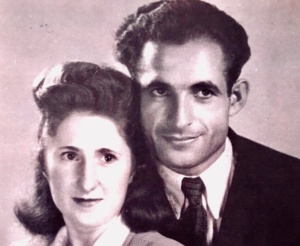Benefactor of Poland Seminar Describes her life as “Miracle”

The story of Sara Mostysser, who lost her parents, sister, grandparents and other relatives during the Holocaust and went on, together with her late husband, Harry, to create a large family and successful business in the US, is not one of survival. It’s too minimal a term to define her life. Rather, it is narrative of a woman who, from a very young age, was to take responsibility for her life and that of others, and make the most of any situation, however great the odds. In her own words, she would describe herself as “a miracle”.
Having endured the horrors of the Holocaust and its anti-Semitic aftermath in her native Poland, she also a living testimony to the kindness of one Polish family that she saved their lives. . It is, in part, this recognition that inspired her to sponsor the TOLI teachers’ seminar that has taken place the last two years in Warsaw and along with it, a visit to Auschwitz and Krakow.
It was, therefore, of significance that her grandson, Eyal, attended the TOLI seminar in Warsaw last year, representing his grandmother and the family.
Born on May 15, 1923 in the village of Stryszów
on the Russian-Polish border, Sara describes her childhood as one filled with family love and Jewish tradition. But all that changed in September 1939 when the Nazis invaded Poland. She witnessed her family’s situation deteriorate as the Nazis took control of her village. On June 19, 1942, her father was killed, forced to dig his own grave by the Nazi soldiers who then shot him.
After that, came a series of horrors – her mother, sister and two brothers, were forced to leave their village, sent to a crowded ghetto, the murder of her grandmother and separation from her mother and sister as they were being gathered for deportation.
It was there, at the railroad station that, unwittingly, her mother saved her life. As camp guards separated the men from women, the fit from the weak, with Sara’s brother Sam (Shmeul) across the line, it was a moment of instinctive Jewish motherhood that she told Sara, “Go to Sam. There is no one to cook for him”, and pushed her toward him.
As it turned out, Sara and Sam were sent to back to a farm to work. Her other brother, Arnold, to a forced labor camp. But her mother and 10-year old sister, Toby, were placed on the train to Sorbibor, the Nazi concentration camp, where they perished.
“The last I saw of Toby she was screaming, “don’t leave me”. To this day, I cannot forgive myself,” said Sara, although she had not control over her own or sister’s destinies.
From then her life – and that of her two brothers (Arnold escaped the camp) – became a series of harrowing experiences and escapes. It was thanks to Herschel, a boy from a nearby village, Ratno who later became her husband (Harry), that they escaped the farm, hid in barns and ditches, freezing and often near-starvation, managing to scavenge a little food from nearby peasant farms.
It was, however, the kindness of a local Polish woman, Rybakova, that they were able to survive the war. They were taken in by the family, for whom they did sewing, tailoring for them and others nearby (both Harry and Sara were accomplished clothes makers, a skill that would serve them well after the war). Arnold and Sam escaped, hiding in nearby towns and forests, where they survived the war.
Following the Russian liberation in 1944, Harry and Sara made their way back to the village, reuniting with Arnold but learning that almost all the other Jews were dead, then to Lodz and after that to the US-occupied zone in Germany. Harry and Sara got married, started a small clothes business and had two children, Toby and Marilyn. Thanks to an invitation from an uncle in New York, they arrived to Ellis Island, June 10, 1949.
If the first chapter of Sara’s life, in Europe, was marked by tragedy and adversity, the second chapter, in the US, was one of remarkable success. Together with Harry, they would form a successful clothing manufacturer. But it was Sara’s prowess as an investor, businesswoman and risk taker that marked her distinguished professional career. At a time when women were rarely in leadership roles, Sara broke barriers with typical determination and acumen to build a large company.
She also built a beautiful family, expanded to children and grandchildren. Harry passed away in 2012.
In 2006, Sara decided to fulfill a lifetime dream that she shared with her husband – making aliyah to Israel. This is the third chapter of her life, one that is marked by the joy of living in the Jewish state and surrounded by grandchildren and great granchildren.
The living legacy of Sara and Harry is faith, family, determination and the ability to rise above adversity and hatred. Add to this her generous support to TOLI, ensuring that educators in her native country of Poland are provided with the resources to learn and teach the Holocaust, never to forget and to apply its lessons today in a world where anti-Semitism has persevered and again threatens European Jewry.
For more information about the remarkable life of Sara Mostysser, see The Bubbe Book and the interview conducted several years ago by the Shoah Foundation.
